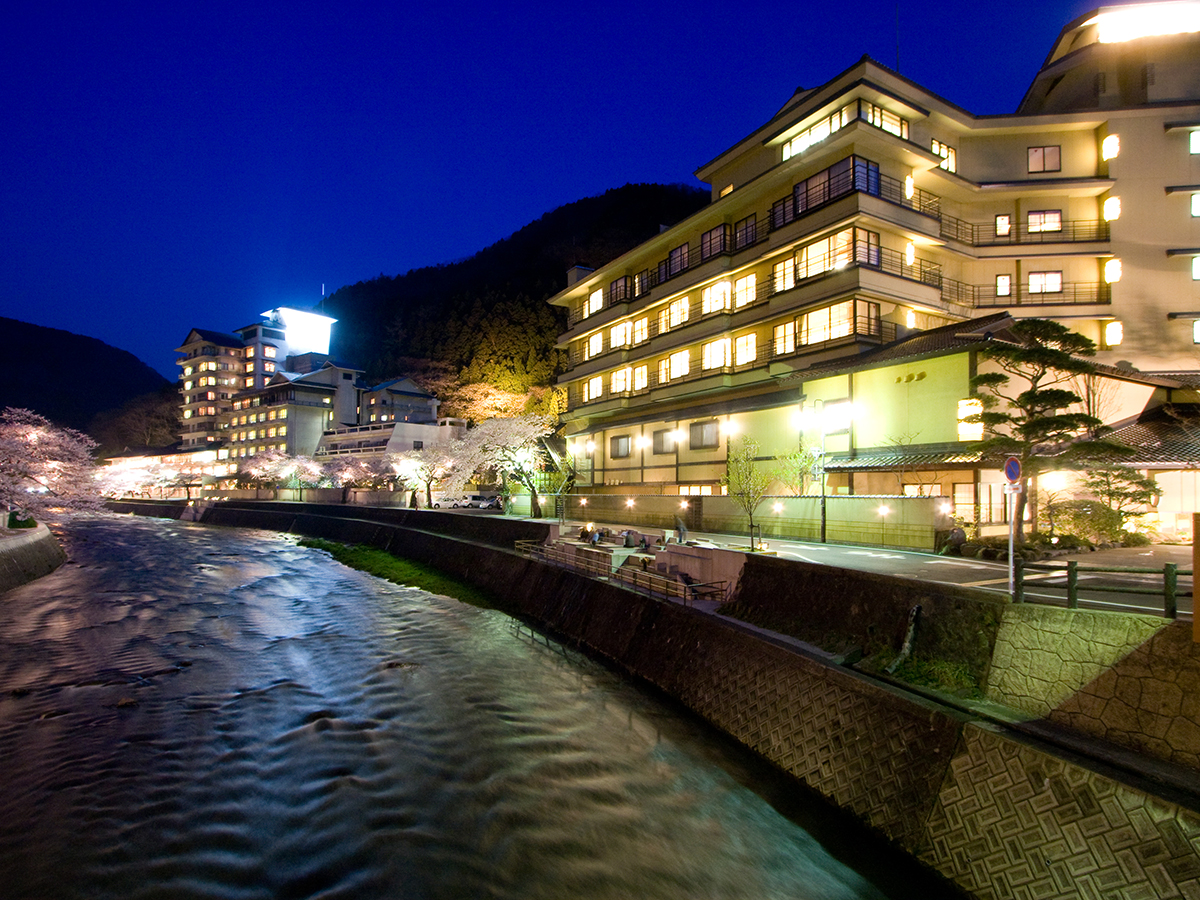
Atsumi Onsen
Atsumi Onsen’s origins trace back 1200 years ago. Several legends converge to the same point in history but all offer a different version of Atsumi Onsen’s origins. They all have in common the healing properties of Atsumi’s hot water: rich in sodium, calcium and sulfates; it is said to be particularly effective for healing wounds, cuts and chronic fatigue. Along the banks of the Atsumi river, in front of the several inns and ryokan, over a hundred cherry trees give an enchanting view in late April/early May, but also has many surprises to give during other seasons: ayu sweetfish fishing in summer and trouts going up the river in autumn.
In Atsumi Onsen, you’ll find three communal foot baths: “Anbe-yu,” “Mosshe-yu,” and “Mokke-yu,” each offering the soothing benefits of the hot spring waters. Of special interest is the charming “Chitto Mosshe” foot bath cafe, which is affiliated with “Mosshe-yu.” This elegant cafe, coupled with an adjacent art gallery, offers a tranquil atmosphere where you can savor unique beverages and delectable sweets. The cafe also showcases the creations of local textile artists and handmade crafts, adding to its distinctive appeal.
Atsumi Onsen, once beloved by nobility and commoners alike, has a rich and welcoming atmosphere. It has a long history as a hot spring resort and has left behind the warm hospitality it has extended to numerous guests in its inns and morning markets. The historic morning market offers local products like Atsumi kabu (turnips) and textiles made of tree bark (Shinaori), as well as fresh mountain vegetables.
Hikers will like to venture inside Mt. Atsumi-dake’s forests, a challenging 2.5 hours (one-way) which will give you a breathtaking view on the Shonai coasts once you have reached its top. The main hiking entrance is a 5 min. walk from the Atsumi Onsen. From June to October, the rose park in front of the Kumano shrine allows visitors to see more than 90 rose species (peak season: June); while savoring a delicious rose-shaped ice cream.
List of hotels/ryokan/inns
Hotels/ryokan
| Name | Phone number | Capacity (persons) | Address | Daytime bathing |
| Tachibanaya | 0235-43-2211 | 403 | Atsumi-cho 3 | Yes |
| Kashiwaya | 0235-43-2011 | 25 | Atsumi-ko 191 | Yes (600 yen) |
| Kuon | 0235-43-4119 | 222 | Atsumi-ji Yunojiri 83-3 | Prior phone call necessary |
| Bankokuya | 0570-00-8598 | 580 | Atsumi-cho 1 | No |
| Atsumiso | 0235-43-2888 | 41 | Atsumi-ko 188 | No |
| Azumaya | 0235-43-2345 | 24 | Atsumi-ko 171 | Yes (600 yen) |
| Takinoya Ryokan | 0235-43-3025 | 54 | Atsumi-ko 169 | No |
Information
| Access | 1. Take the bus from Tsuruoka’s JR station (Japanese name: Tsuruoka Ekimae)’s bus stop n°1 bound for Atsumi Onsen 2. Get off the bus at Ashiyu Anbeyumae (70 min.) Bus timetable: https://www.shonaikotsu.jp/english/tourism/atsumi_tt.html |
|---|---|
| Properties | Water composition: Sodium, Calcium Chloride, Sulfate Effective on the following conditions: Wounds, cuts, skin conditions, chronic fatigue |
| Official Website | https://atsumi-spa.or.jp/ |
